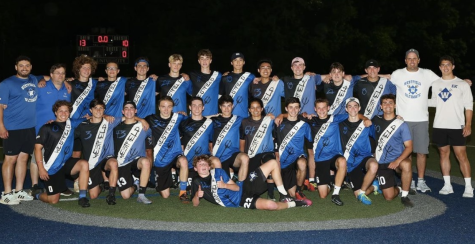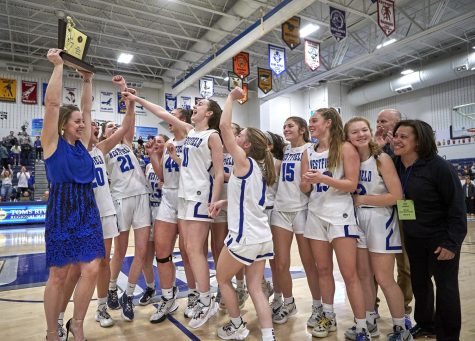Football players gauge CTE risk
On July 25, The New York Times published an article detailing a study conducted by Dr. Ann McKee, a neuropathologist at Boston University. McKee studied the brains of 111 deceased NFL players, ranging in age from 23 to 89, and found that 110 of those brains had chronic traumatic encephalopathy, better known as C.T.E.
This degenerative disease causes symptoms such as depression, memory loss and confusion. Based on McKee’s study and other examinations through the years, scientists can confirm the disease has a direct correlation with repeated blows to the head. These types of blows are seen during nearly every play of a football game.
So as the Westfield football program storms ahead in search of a third straight state title, it seems fair to ask whether or not these young men are at risk of serious injury as they take the field.
WHS head athletic trainer Mr. Steve Barandica understands the severity of repeated blows to the head.
“Every head injury must be treated as a significant head injury,” Barandica said. “It is imperative for all athletes to be screened properly following any head injury. Athletes experiencing concussion symptoms should be immediately removed from play.”
WHS assistant trainer Ms. Nicole Castellano expressed the same need for immediate response to blows to the head. “Long-term problems are a concern if the head injury is very severe, if it is not treated correctly, or if the athlete has a series of concussions over a short period of time,” Castellano said.
Currently, Barandica and Castellano are treating six concussions among the fall sports at WHS. Half of those injured athletes are on the football team, Castellano said.
Jim DeSarno, head coach of the WHS football team for the past 12 years, emphasizes the importance of playing the game safely.
“We constantly stress proper form in tackling and blocking,” DeSarno said. “It’s important to fully explain how to block and tackle as well as make the players understand how they can put themselves in position to injure themselves if they don’t do those things correctly.”
DeSarno said he and his staff “put the players’ health above wins and losses,” and believe that “educating players is the key.”
Westfield’s football players, from the seniors on varsity to the first-year freshmen, are well aware of the dangers of the sport. Senior center Jack McCauley had to sit out his entire eighth-grade football season due to a concussion. “I’m always aware that it’s a significant danger,” McCauley said. “But it’s never scared me away.”
Freshman linebacker Travis Smith is also conscious of the dangers of playing football. “My brothers and some of my friends have had concussions from playing football,” Smith said. “But I try and think about all the good things in football, like winning and having fun with my teammates.”
A WHS student, who asked not to be identified, quit the football team after sustaining five concussions. “I actually wish I could still be playing without major possible health consequences,” the student said.
Senior linebacker Shea Elliott shares this love for the game as well. When it comes to head injuries, Elliott said, “It is something I think about and am aware of,” but noted that the team’s coaches do a “great job of preaching proper tackling form at practice.”
Added Elliott: “I understand there will always be risks, but if played the right way, the positives that one can take away from football will last a lifetime.”
Elliott hopes he’ll be able to look back on his football career without regrets. That’s the case for receivers coach Samuel Haimann, who played high school football. Haimann, who has coached at WHS for 10 years, sustained a concussion on the first play of his final high school game.
That was by no means the only head injury Haimann has witnessed as a player and coach. “There were significant head injuries suffered by some of my teammates and during the time I’ve been coaching, which is over 20 years,” he said. “I’ve seen too many to count.”
Haimann said he “didn’t really give much thought to the possible dangers” when he was playing, but added, “There’s no way I would’ve missed it.”
Senior fullback Benny Buontempo has a similar philosophy about the injury risk he and his teammates face. “Football is a family, and we are all going to war together,” he said. “Sometimes there are risks with that, but it’s a risk I’m willing to take.”
So as the Westfield football program storms ahead in search of a third straight state title, it seems fair to ask whether or not these young men are at risk of serious injury as they take the field.
WHS head athletic trainer Mr. Steve Barandica understands the severity of repeated blows to the head.
“Every head injury must be treated as a significant head injury,” Barandica said. “It is imperative for all athletes to be screened properly following any head injury. Athletes experiencing concussion symptoms should be immediately removed from play.”
WHS assistant trainer Ms. Nicole Castellano expressed the same need for immediate response to blows to the head. “Long-term problems are a concern if the head injury is very severe, if it is not treated correctly, or if the athlete has a series of concussions over a short period of time,” Castellano said.
Currently, Barandica and Castellano are treating six concussions among the fall sports at WHS. Half of those injured athletes are on the football team, Castellano said.
Jim DeSarno, head coach of the WHS football team for the past 12 years, emphasizes the importance of playing the game safely.
“We constantly stress proper form in tackling and blocking,” DeSarno said. “It’s important to fully explain how to block and tackle as well as make the players understand how they can put themselves in position to injure themselves if they don’t do those things correctly.”
DeSarno said he and his staff “put the players’ health above wins and losses,” and believe that “educating players is the key.”
Westfield’s football players, from the seniors on varsity to the first-year freshmen, are well aware of the dangers of the sport. Senior center Jack McCauley had to sit out his entire eighth-grade football season due to a concussion. “I’m always aware that it’s a significant danger,” McCauley said. “But it’s never scared me away.”
Freshman linebacker Travis Smith is also conscious of the dangers of playing football. “My brothers and some of my friends have had concussions from playing football,” Smith said. “But I try and think about all the good things in football, like winning and having fun with my teammates.”
A WHS student, who asked not to be identified, quit the football team after sustaining five concussions. “I actually wish I could still be playing without major possible health consequences,” the student said.
Senior linebacker Shea Elliott shares this love for the game as well. When it comes to head injuries, Elliott said, “It is something I think about and am aware of,” but noted that the team’s coaches do a “great job of preaching proper tackling form at practice.”
Added Elliott: “I understand there will always be risks, but if played the right way, the positives that one can take away from football will last a lifetime.”
Elliott hopes he’ll be able to look back on his football career without regrets. That’s the case for receivers coach Samuel Haimann, who played high school football. Haimann, who has coached at WHS for 10 years, sustained a concussion on the first play of his final high school game.
That was by no means the only head injury Haimann has witnessed as a player and coach. “There were significant head injuries suffered by some of my teammates and during the time I’ve been coaching, which is over 20 years,” he said. “I’ve seen too many to count.”
Haimann said he “didn’t really give much thought to the possible dangers” when he was playing, but added, “There’s no way I would’ve missed it.”
Senior fullback Benny Buontempo has a similar philosophy about the injury risk he and his teammates face. “Football is a family, and we are all going to war together,” he said. “Sometimes there are risks with that, but it’s a risk I’m willing to take.”









